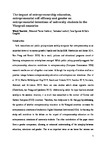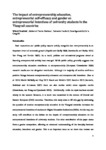The impact of entrepreneurship education, entrepreneurial self-efficacy and gender on entrepreneurial intentions of university students in the Visegrad countries
| dc.contributor.author | Haddoud, Mohamed Yacine | |
| dc.date.accessioned | 2017-08-27T16:10:27Z | |
| dc.date.available | 2017-08-27T16:10:27Z | |
| dc.date.issued | 2017-08-21 | |
| dc.identifier.issn | 0307-5079 | |
| dc.identifier.issn | 1470-174X | |
| dc.identifier.uri | http://hdl.handle.net/10026.1/9867 | |
| dc.description.abstract |
This paper investigates whether entrepreneurial education (EE) contributes to the entrepreneurial intentions (EI) of university students in the Visegrád countries (Czech Republic, Hungary, Poland and Slovakia). The results show several differences with regard to the impact of education and entrepreneurial self-efficacy (ESE) on entrepreneurial intentions across the four nations. The direct impact of entrepreneurship education was positive and significant in only one country, Poland, the only of the four countries to have introduced entrepreneurship education at high-school level. Additionally, an indirect influence of EE on EI was uncovered. Using a multi-construct approach to ESE, the research proves that ESEs related to searching, planning and marshalling activities mediate the impact of entrepreneurial education on intentions, although these effects differ across the studied countries. Lastly, a gender comparison indicates that although women generally have lower entrepreneurial intentions and display lower levels of ESE they benefit more than men do from entrepreneurship education. | |
| dc.format.extent | 361-379 | |
| dc.language | en | |
| dc.language.iso | en | |
| dc.publisher | Informa UK Limited | |
| dc.subject | Entrepreneurship education | |
| dc.subject | gender differences | |
| dc.subject | self-efficacy | |
| dc.subject | career choice | |
| dc.subject | entrepreneurial intentions | |
| dc.title | The impact of entrepreneurship education, entrepreneurial self-efficacy and gender on entrepreneurial intentions of university students in the Visegrad countries | |
| dc.type | journal-article | |
| dc.type | Journal Article | |
| plymouth.author-url | https://www.webofscience.com/api/gateway?GWVersion=2&SrcApp=PARTNER_APP&SrcAuth=LinksAMR&KeyUT=WOS:000456041100011&DestLinkType=FullRecord&DestApp=ALL_WOS&UsrCustomerID=11bb513d99f797142bcfeffcc58ea008 | |
| plymouth.issue | 2 | |
| plymouth.volume | 44 | |
| plymouth.publication-status | Published | |
| plymouth.journal | Studies in Higher Education | |
| dc.identifier.doi | 10.1080/03075079.2017.1365359 | |
| plymouth.organisational-group | /Plymouth | |
| plymouth.organisational-group | /Plymouth/Faculty of Arts, Humanities and Business | |
| plymouth.organisational-group | /Plymouth/REF 2021 Researchers by UoA | |
| plymouth.organisational-group | /Plymouth/REF 2021 Researchers by UoA/UoA17 Business and Management Studies | |
| dcterms.dateAccepted | 2017-08-01 | |
| dc.rights.embargodate | 2019-2-21 | |
| dc.identifier.eissn | 1470-174X | |
| dc.rights.embargoperiod | Not known | |
| rioxxterms.versionofrecord | 10.1080/03075079.2017.1365359 | |
| rioxxterms.licenseref.uri | http://www.rioxx.net/licenses/all-rights-reserved | |
| rioxxterms.licenseref.startdate | 2017-08-21 | |
| rioxxterms.type | Journal Article/Review |



